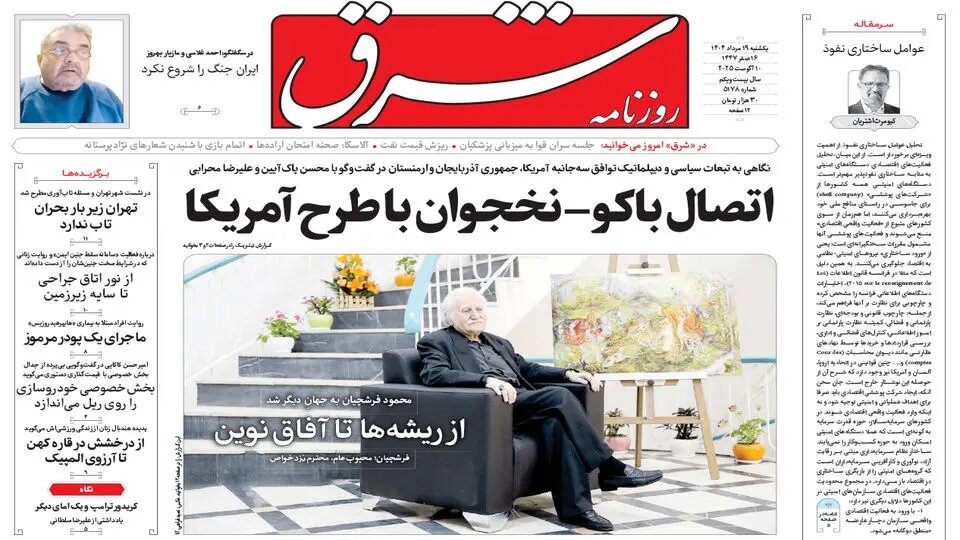Iran’s interests and concerns in regard to new corridor

TEHRAN - In a note, Shargh discussed the Friday agreement between Armenia and the Republic of Azerbaijan on the Zangezur corridor under a new name.
It wrote: From Iran’s point of view, any transit route that can strengthen the North-South connection and create trade and transit opportunities is potentially positive. The Armenian Prime Minister has also explicitly emphasized the importance of a rail connection with Iran and has even mentioned the role of Iranian companies in Armenia’s road and rail projects. This could, in an optimistic scenario, make Iran one of the main beneficiaries of the project. However, the involvement of the United States in the project has made Iran not to see it just as an opportunity. For Iran, this agreement represents a complex equation, offering economic opportunities while simultaneously posing security challenges. In such a situation, maintaining an analytical approach, strengthening an active diplomatic presence, and utilizing regional multilateral formats such as the "3+3" (3+3 refers to a proposed regional cooperation platform involving the three South Caucasian countries - Armenia, Azerbaijan, and Georgia - and their three larger neighbors Russia, Turkey, and Iran) could be the best path to defending national interests and preventing Tehran from being marginalized in the developments in the Caucasus.
Vatan-e-Emrooz: Nobel of betrayal
In an analysis, Vatan-e-Emrooz condemned the online remarks by Nobel Peace Prize laureate Narges Mohammadi during a virtual appearance at a Hiroshima commemoration event organized by fellow laureate Nihon Hidankyo, describing her speech as treacherous and politically charged in the broader campaign against nuclear weapons. It wrote: Narges Mohammadi's speech at the annual conference of the Nobel Peace Center is a new example of the functioning of international institutions in the strategies of the United States and the West against Iran. Nearly 2 months after the U.S. and the Zionist regime attacked Iran, Narges Mohammadi spoke of the necessity of putting an end to Iran's peaceful nuclear program. That is what Trump and 3 European countries are now seeking. Her speech was exactly the voice that Trump and Netanyahu were expecting to hear from inside Iran, and she acted in line with the U.S. and Zionist regime's plan against Iran. Mohammadi's speech is a clear example of the betrayal of the homeland. Moreover, she has actually encouraged the enemy to attack Iran again. Iran is now in a state of war. One of the essential requirements of this situation is to clearly confront any internal betrayal. It seems that dealing with enemy elements and agents is the people's highest demand and wish.
Etemad: Return to negotiations?!
In an interview with the Etemad newspaper, Rahman Ghahremanpour, an expert on international affairs, examined the purported reports by Western media Iran and the United States are planning to resume negotiations over Tehran’s nuclear program after the 12-day war against Iran in June. He said: Based on information received from multiple sources, it seems that reports regarding the possibility of resuming negotiations between Iran and the United States are true, and it seems that Iran has decided to return to the negotiating table in order to maintain the diplomatic path and prevent the channels of dialogue from being closed. This decision was probably made in order to reduce tensions and create peace of mind in the country, especially given the concerns about the possibility of escalating tensions. However, it is still unclear whether the United States will agree to Iran’s preconditions and proposals or not. Evidence suggests that negotiations will begin soon, but given the deep differences between the two sides and Iran’s deepening distrust of Washington after the 12-day war, we cannot be optimistic about the success of the negotiations. The current conditions for reaching an agreement seem much more difficult, even compared to the period before the 12-day war.
Khorasan: The first test of the Supreme Defense Council; Caucasus and Lebanon
In an article, Khorasan dealt with the serious test of Iran’s Supreme Defense Council regarding developments in Lebanon and the South Caucasus region. It wrote: A less-noted fact is the establishment of the Supreme Defense Council in Iran, an institution that is expected to play an analytical and guiding role amidst regional crises. The Zangezur issue in the Caucasus and the Hezbollah disarmament project have now become two serious tests for the council at the beginning of its work. Adopting the right strategy in these two cases can change the balance. If Iran can take the initiative from the Americans on both fronts, it will not only increase its authority in the region, but will also appear with full hands in the face of political and economic pressure from the West. Of course, decision-making in these areas is undoubtedly accompanied by great strategic risks and the possibility of security confrontations. "Analysts believe if U.S. influence is diminished in the Caucasus and Lebanon, the resulting shift could bolster Tehran’s strategic security and offer it renewed leverage in both regional dynamics and international negotiations.
Leave a Comment